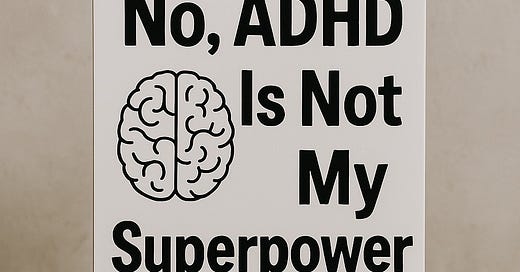Let me just say it: ADHD is not my superpower. It’s not a quirky personality trait or some “productivity hack” I whip out when I need a creative edge. It’s not a fast pass to brilliance or innovation.
It’s a real, often misunderstood neurodevelopmental condition that makes everyday life feel like a high-stakes balancing act — where I’m dropping balls even when I’m trying my absolute best, especially when I am.
I know people mean well when using words like “gifted” or “neurodivergent advantage.” But let’s be honest — most of the time, those words feel more like a performance requirement than a reflection of what living with ADHD is really like. They don’t hold space for the mess, the chaos, or the crash that often comes right after the burst of energy.
Much of that language feels more about other people’s comfort than my truth.
💥 Why the “Superpower” Narrative Wears Me Out
I get why people want to put a positive spin on ADHD. But calling it a “superpower” skips over so much. It turns something that can be incredibly disabling into something that’s supposed to be inspiring, which comes with a ton of pressure.
Suddenly, I’m only allowed to take up space if I’m exceptional. If I’m productive. If my hyperfocus creates something worth sharing.
This unspoken agreement becomes: “We’ll accept your ADHD — as long as you turn it into a talent show.”
But if ADHD were just a superpower, I wouldn’t be constantly teetering on the edge of burnout after doing basic life stuff. I wouldn’t feel like I barely keep up while everyone else runs laps. I wouldn’t be cycling through guilt over the emails I haven’t answered, the appointments I forgot, or the days I just… couldn’t.
⚙️ It’s Not About Distraction — It’s Also About Dysfunction
ADHD isn’t a short attention span or a quirky tendency to daydream. It’s executive dysfunction. My brain glitches when I need it to show up the most.
For me, it often looks like:
Knowing exactly what I need to do — and still being unable to start
Losing time or completely zoning out, then scrambling to catch up
Feeling overstimulated by noise, lights, decisions, or just people
Having emotions hit me like tidal waves, with no warning and no off-switch
Explaining, over and over again, why “just try harder” doesn’t work
That’s not charming. That’s not a cute inconvenience. It’s a neurological difference that impacts how I function at home, at work, and in relationships — and it’s draining, especially in a world that demands conformity over compassion (Barkley, 2015; Ramsay & Rostain, 2015).
😤 I’m Not Here to Be Exceptional
The hardest part about the “superpower” label is how it erases people like me — the ones who are just trying to get through the day.
I’m not launching a startup. I’m not monetizing my hyperfocus. Some days, I’m just trying to keep my apartment semi-clean and respond to a text without spiraling.
ADHD doesn’t need to look impressive for it to be real. It still matters when it looks like chaos and clutter. I still matter when I’m just surviving.
We don’t owe anyone a genius narrative. My value isn’t tied to how well I can mask or how much I can produce.
🛠️ I Don’t Need Toxic Positivity. I Need Support.
This isn’t about being negative — it’s about telling the truth.
Yes, there are moments when my ADHD helps me connect dots no one else sees. When I get into the flow, something beautiful or unexpected happens. But that brilliance is never free. It comes with emotional hangovers, sleep deprivation, sensory overload, and moments of crushing self-doubt.
We don’t need more feel-good slogans. We need real, tangible support:
Flexible workplaces that understand adaptability are not coddling
Systems that don’t punish our brains for showing up differently
Supports that meet us where we are — not where we’re “supposed” to be
Conversations that make room for both resilience and reality
So, no — ADHD is not my superpower.
It’s not my brand. It’s not a vibe. And it’s definitely not something you can dress up in glitter and call a gift.
It’s real. It’s frustrating. It’s often invisible.
And if you’re just trying to get through the day without falling apart — I see you. You’re not weak. You’re not broken. You’re doing your best in a world that keeps asking you to pretend.
And that? That’s strength.
But even though it’s not a superpower, I still get to choose how I define it. I’m not here to sugarcoat it or spin it into something it’s not — but I can find meaning in how my brain works. I can acknowledge the mess and still honor the moments of clarity, intuition, creativity, and depth that sometimes come with it. I can name the struggle without erasing my strength. ADHD doesn’t need to be a superpower to be mine — to be something I learn to live with, work with, and even sometimes find a strange kind of beauty in. Not because it’s easy or magical, but because I’ve made space for my truth — and that’s powerful in its own right.
📚 References (APA 7th Edition)
Barkley, R. A. (2015). Attention-deficit hyperactivity disorder: A handbook for diagnosis and treatment (4th ed.). Guilford Press.
Ramsay, J. R., & Rostain, A. L. (2015). The adult ADHD tool kit: Using CBT to facilitate coping inside and out. Routledge.
Sedgwick, J. A., Merwood, A., & Asherson, P. (2019). The positive aspects of attention deficit hyperactivity disorder: A qualitative investigation of successful adults with ADHD. ADHD Attention Deficit and Hyperactivity Disorders, 11(3), 241–253. https://doi.org/10.1007/s12402-018-0277-6
Weyandt, L. L., & DuPaul, G. J. (2013). College students with ADHD: Current issues and future directions. Springer.





We really need to become aware of our ableist hustle mindset where we devalue the ordinary and uphold eugenics.
Acceptance is the key! Not acceptance on someone else’s scale, but our own.